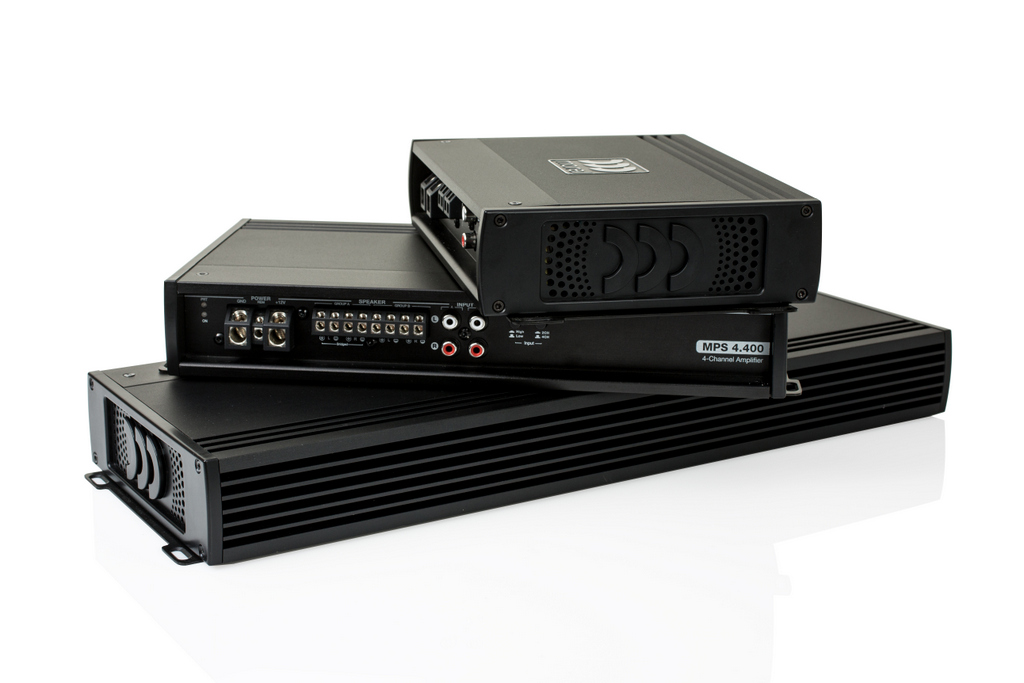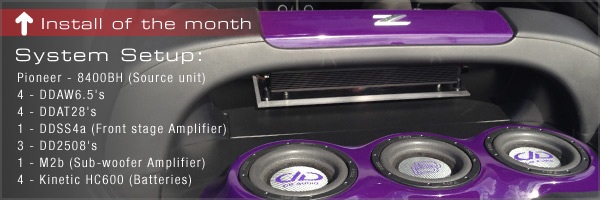DDownlow from Digital Designs in The US of A
Each month the bass psychopaths at Digital Designs send out a newsletter about them and their doings.. Here’s this month’s.
Over 6 Million Combinations – Only One Choice; what the heck does that really mean? With DD, that means you’re able to customize any woofer to fit your specific application. Many customers don’t realize our custom options go beyond dustcaps and logos. We also offer options on baskets, cones, suspensions, motors, and voice coils. Each of these options have different performance aspects that can help you optimize a true custom audio system. As we all know, if everyone wanted stock they wouldn’t be buying DD subs in the first place. So check out this quick rundown of the available options that could take your next build to a higher level.
DD Customization Options
Dustcap Logos: You can get either the Double D DD logo or the new DD Audio logo in your choice of 14 colors.
Baskets: We offer several powder coat color options for matching baskets to vehicle color schemes.
Composite Dustcaps: The addition of a composite dustcap adds aesthetic appeal plus cone rigidity.
Composite Cones: We offer several colors and three performance levels of composite cones; Feather Lite, Lightweight, and Strength. Each cone type is made with materials that meet specific performance demands.
Suspension: There are three suspension options; Soft, Standard, and X-Stiff. By changing the suspension of the woofer you can better accommodate different enclosures and specific user types.
Motors: On our current 1500 series subwoofers you can increase motor control and efficiency with the SuperCharge option.
Voice Coils: The 3500, 9500, and Z series woofers have up to 8 different coil options. The Options include impedance and wire type.
For pricing or more information on our performance enhancements contact an authorized DD retailer. In the UK that’s link
Upcoming
DD Woofer box face-lift
DD Audio is pleased to announce a bold new look for our American made subwoofer packaging. We based this change on the feedback we received from our customers worldwide. We will continue to be environmentally conscious by using 100% recyclable materials from an SFI (Sustainable Forestry Initiative) certified supplier. The redesigned look features an in-your-face woofer image with an eye catching red DD logo, and proudly spotlights six DD subwoofer innovations. We hope you enjoy the new look, and keep the feedback coming.
Setting Sub Amp Crossovers
Our tip this month deals with how to quickly and correctly set the crossovers on a DD sub amp. (A lot of the principles will still obtain for all sorts of brands amps, though. Ed.) An understanding of how to set crossover points is a must in the world of high performance car audio. The harder you push your audio equipment the more protection you’ll need to utilize in your install, and one of the most common ways to protect your speakers is through the proper use of crossovers. That’s why all DD sub amps come equipped with both sub sonic(SSF) and low pass(LPF) crossovers enabling you to set up a bandpass filter for optimal protection and optimal use of your amps energy.
One of the most common mistakes when setting sub amp crossovers is setting the SSF too low. When the SSF is set too low your amplifier will waste massive amounts of energy trying to produce sub frequencies that are inaudible due to the vehicles transfer function. Another symptom of an improper SSF setting is reduced enclosure control of the subwoofer/s during high volume listening. This is due to the woofer playing below the vehicle’s actual tuning.
The universal bandpass filter settings on a sub amp are 30Hz on the SSF and 80Hz on the LPF. What most people fail to realize is every vehicle has a different sub frequency transfer function. This means when setting up crossovers there’s not really a one size fits all setting. Luckily setting the crossovers for your specific system can quickly and easily be done by ear with the following steps:
Complete the tuning on your mids and highs, and set the gain level on the sub.
To allow for accurate tuning close the vehicles doors, trunk, hatch, etc.
Put on your favorite song and turn the volume up to your normal listening level.
Turn your Subsonic Filter down to 10Hz then slowly turn up the filter frequency until you hear it take effect on your sub bass. The SSF is now correctly set.
Turn the Low Pass Filter to the setting that allows for the best sound for your system. This will vary depending on type of sub and source material being played. The LPF is now set.
Now that your crossovers are correctly set for your specific system you will have more enclosure control and more output capability.
INSTALL OF THE MONTH
Andrew Mayeux has been interested in car audio since his early teens. After experimenting with different brands, and system set ups, he hooked up with Adam, and the crew from MST in Prairieville Louisiana. That was also first exposure to DD Audio. After getting a demo of the DD1508’s from the guys at MST, his mindset of “only big subs give big bass.” was completely changed. Thus his love affair with DD began.
He scrapped his original set up, and decided that DD would be the focal point of his new build. Given the limited space in his Nissan 350Z, he wanted to make sure he could get maximum output from his system, while at the same time keeping the install as compact as possible. After consulting with MST, he chose to go with 3 of the DD2508’s as the sub-woofer for his build. To round out the rest of the system he chose the DDAT-28’s, and the DDAW6.5’s. We had the chance to meet with Andrew, and check out his ride at last years Siknic car show, and it sounded awesome!
ddaudiotv
Check out our newest video featuring the new and improved gluing procedure for installing composite dustcaps. Don’t forget to subscribe to our channel to get the latest video updates!.

